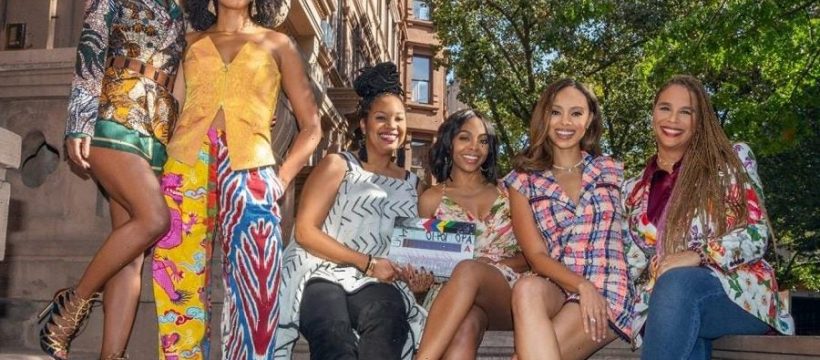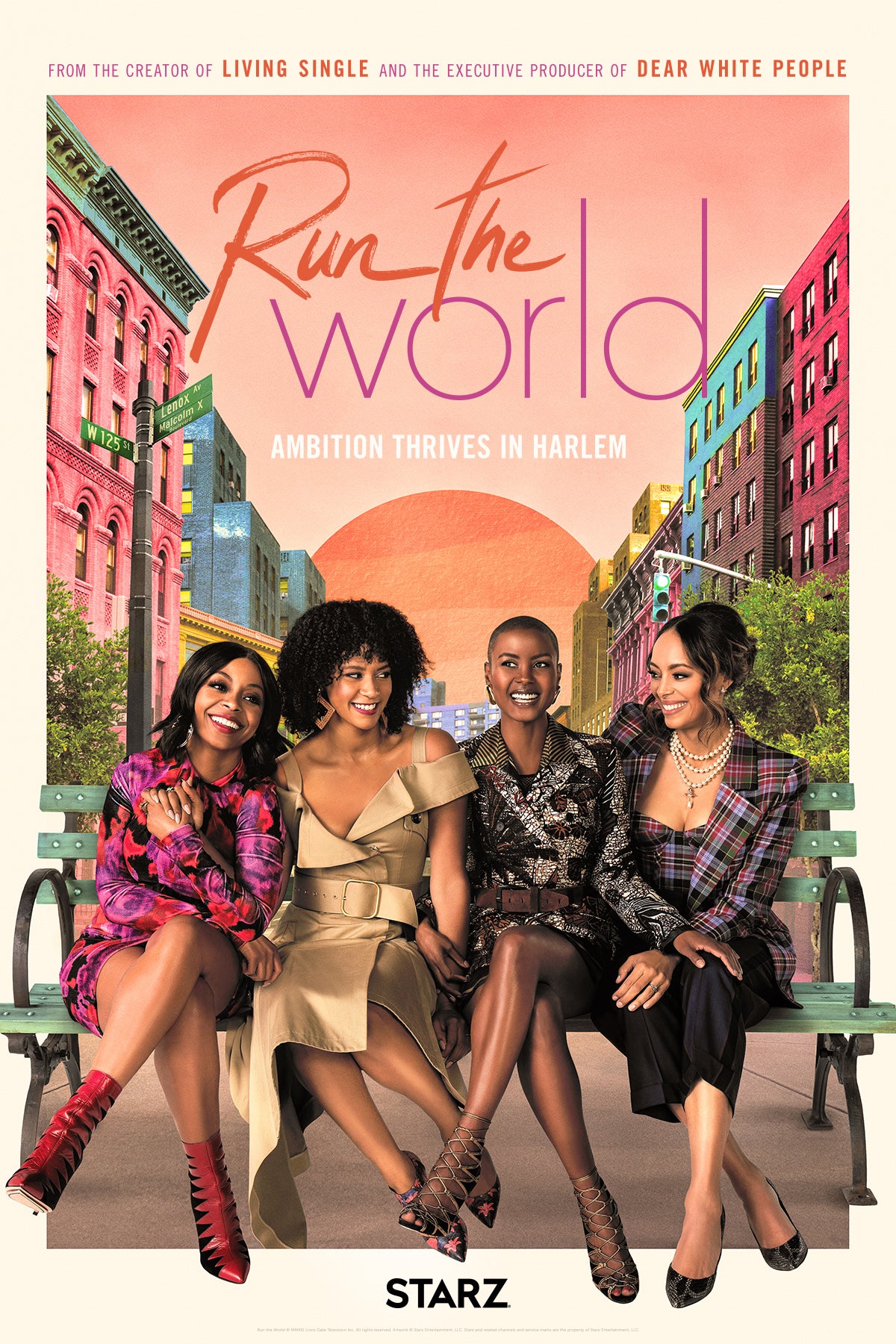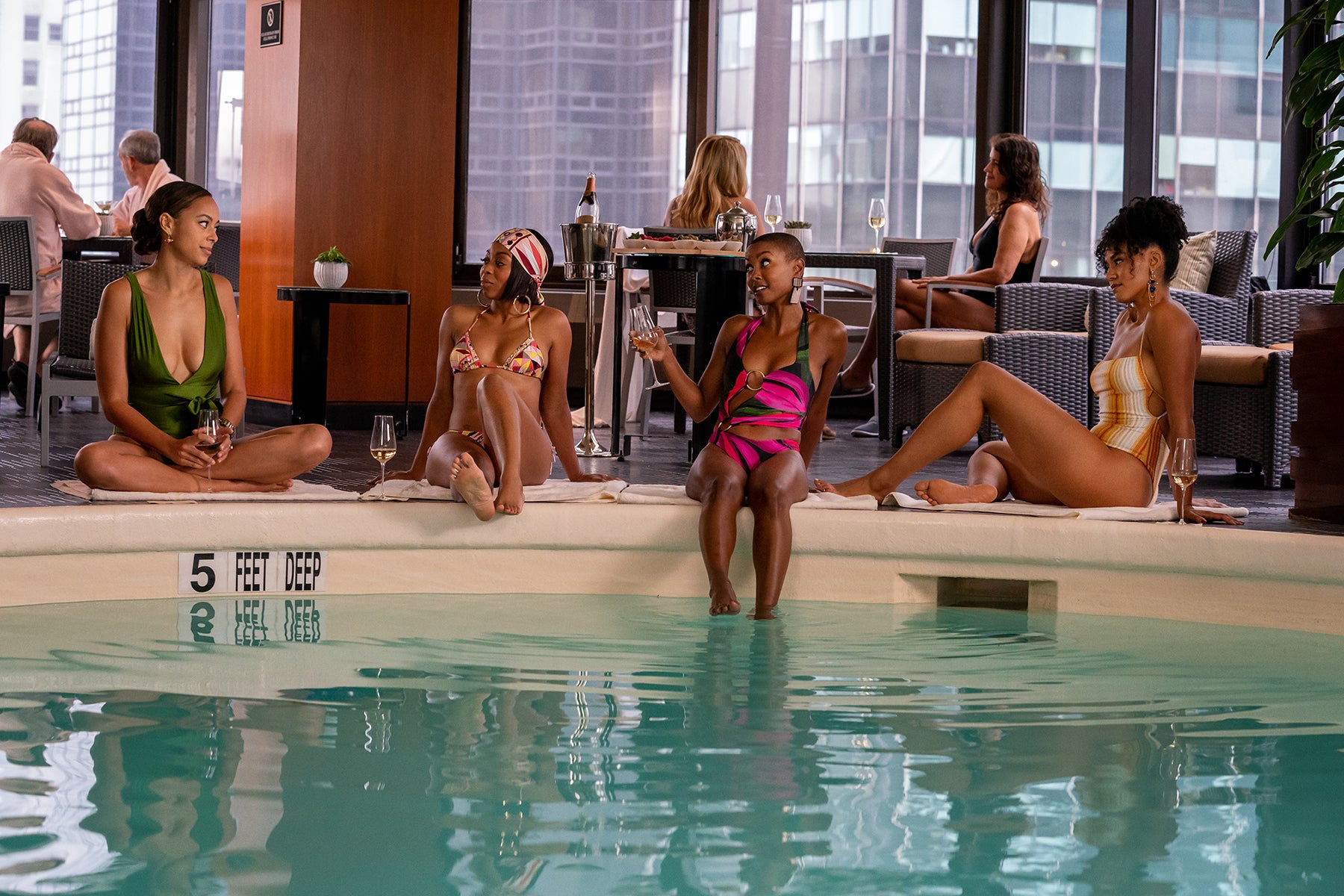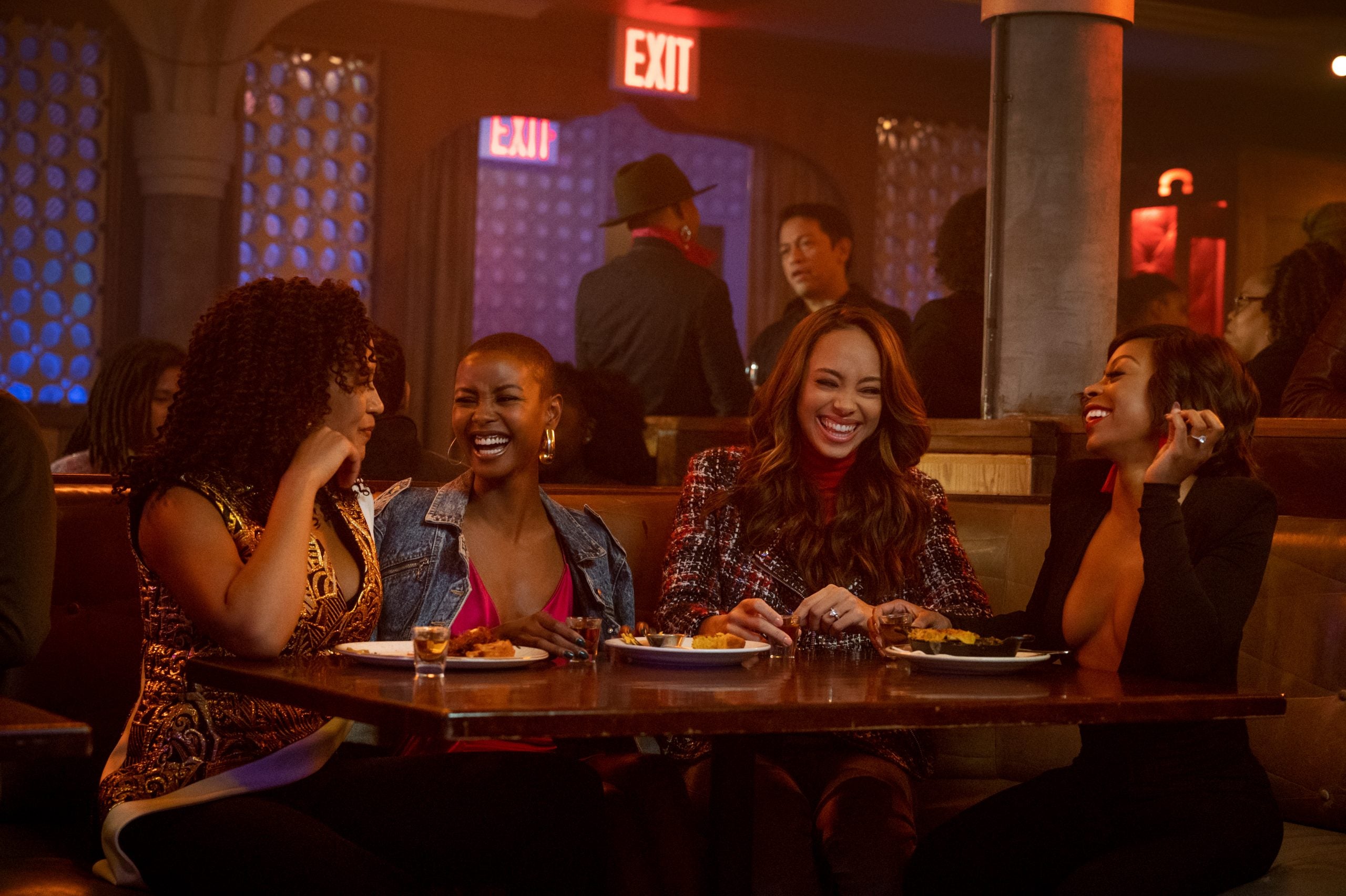For the last three decades, audiences have witnessed Yvette Lee Bowser change and redefine television as a writer and producer. From the creation of the iconic sitcom Living Single to writing and producing A Different World, Bowser’s ability to tell our stories and showcase a range of Black experiences has earned her status as the Black Nostradamus of Entertainment.
At the age of 27, the Philly-born, Cali-bred creator became the first African-American woman to develop her own primetime series. Living Single became the blueprint for many series, but when networks like NBC used it to create Friends, Bowser catapulted being a creator of color to another level. Now, in addition to executive producing shows like Dear White People and black•ish, she is working alongside Leigh Davenport on Run the World. The new STARZ Original –a half-hour, eight-episode series — is equal parts a love letter to Black women friendships as well as Harlem.
Starring Bresha Webb (“Renee Ross”), Amber Stevens West (“Whitney Green”), Corbin Reid (“Sondi Hill”), and Andre Bordeaux (“Ella McFair”), the show follows four career-driven BFFs as they live, love and blossom in an impressive and relatable way. As a project, the show continues Bowser’s legacy as a mentor and her commitment to inspire the next generation of talented voices.
ESSENCE had a chance to rap with the longtime member of the Writers Guild Showrunner Training Program about how Run the World came to be, why the critics never fazed her, and how Jay-Z’s “Moonlight” video struck her in a way that the possible Rock Hall of Fame artist, Issa Rae and the other fabulous actors could not have known.
We are in another unprecedented time in Hollywood where there are more Black women featured in roles in front of and behind the camera. How does it feel as an industry veteran to see that happening?
YVETTE LEE BOWSER: Firstly, we deserve it. It’s phenomenal to see, and deeply gratifying to play a small part in that change. My 33 years in the business have blessed me to be able to help the culture evolve, and that’s what I’m here to do. As a storyteller, I seek to develop the culture, as well as entertain the audience, and I think these moves are a step in the right direction to create more leading roles that feature African Americans—women in particular. I think that the industry is starting to acknowledge that Black is powerful—because let’s be honest—Black equals green, so why not bet on Black because we’re amazing.
It’s a proven business decision, and I believe more corporations are starting to see that because they ultimately [the move] pays the bill. While progress is being made with on-screen talent, we have a lot of work to do here. I am hoping that the success of each show and movie about us will encourage more inclusivity in the industry for all underrepresented groups, and I think Run the World will certainly play a role in that. I think people will see us in this beautiful, complex, and layered light, but also, bring audiences to their platforms. There is still a lot of work to do in all areas of production: writers, producers, directors, executives, agents, the crew, and beyond.
It should also extend to the studio, the network, and all the streaming companies, and distributors because we have got to go further to diversity those ranks as those are the people who have the ability to green light the project from the start.
There has been a healthy migration of writers—in the media world and other places—who have transitioned into working writers in the space. For those looking for insight on how to enter the game, could you share how those initial conversations went between you and Leigh Davenport?
YLB: Our initial conversations really focused on how even though we were two very different women from different generations, we had similar points of view. That’s how we could find common creative ground, work together, and make a great series. Where we differed, we found that we had perspectives that complimented one another, and that added a lot of depth to the characters in the stories that we tell in Season One. There was room for my ideas and my experiences to be told, even though the series was informed by Leigh’s life and her friends in Harlem. The opportunity to bring others into the tent is something that you really want to do with your show. One of the keys for me for creative success is to leave room for discovery, yes have a clarity of vision, but leave room for discovery so that other people can bring ideas that amplify and elevate what you want to do.
It’s series television, where you plan to live with these characters for years. It’s very different from writing a play for Broadway, where it can be on stage for a decade. But it’s the same play. This is longform television storytelling, so it’s a different beast in that way. Leigh and I, and our process, we collaborated and coalesced around these characters, their stories, and the themes and vibes that we both felt passionate about. And in the bigger picture, we shared the aspiration that the world could serve as an inspiring cultural mirror in 2021, so I was on board. Once I had committed to setting other things aside, and separating these four women onto the air, I was all in.
The characters on Run the World present new options for audiences who have been asking for more representation of Black friendships for women and men. With such high stakes when a new show premieres, do you get nervous about initial fan reactions or critic reviews?
YLB: I don’t, and I don’t think that’s because I’m jaded. The perspective I have about my work is that I write what I know and what moves me, and I hope the audience enjoys it. You can’t worry about pleasing everyone because you never will, but you can hope that your stories and your characters encourage as many people as possible to gather around their modern-day campfire and enjoy the art of storytelling. I think it’s one of the things I’m most relaxed about because I’m very into the details of the work, but when I’m doing and producing it, and then letting it out into the world, I just don’t think of nervousness.
What I’m here to do, depicting women of color being free, and living their lives unapologetically to the fullest, is exacting the thing that we need right now. We need to remind ourselves that it’s possible with everything else that’s telling us that’s not. In society, we’re here to tell you that it is possible. It excites me that we’re bringing these very multidimensional women onto the screen, and seeing them live it up out in the world at a time when so many people are craving that experience. Hopefully, in the real world, we are getting to a place where people are back outside and reclaiming their lives, but experience it vicariously while watching this show.
The pilot episode throws us into a moment when Soulja Boy Tell ‘Em’s rap history gets highlighted in a way that’s sure to be talked about by audiences. It is scripted scenes like this that definitely drive home the point that Run the World is not Living Single, and that it shouldn’t be compared to your previous work. What do you hope that newcomers to this show and fans of your work take away after watching the first few episodes?
YLB: As you said, it’s not Living Single. It’s its own thing. Every show has its own DNA, and stories about women, and friendship are timeless. Every generation of women deserve to tell their stories in their time. At the core, both shows are about joy, love, and the support that you get from having enviable female friendship, so there is a common thread there. For me, Run the World continues the journey that I’ve been on for decades and telling authentic stories from a strong and specifically Black woman point of view.
Run the World is happening in a very, very different, more complicated time in our world. As well as this being a post-pandemic show, I think people are going to probably get a little more from it because we need more right now. There’s a craving for shows like this, and I think Run the World is going to be just the elixir that the audience needs. Aesthetically, it’s also different because Run the World is a single camera show, which is much more cinematically ambitious. It’s also a more immersive experience than Living Single was allowed to be in its time. We have access to more resources with this show than with Living Single. We’ve always done more with less historically, but Lionsgate and Starz really stepped up to the plate and let us produce the show we wanted to.
Those are definitely differences. Living Single, Run the World accurately reflect a Black consciousness, Black love, and Black culture, as well as fashion trends, and Run the World is a show that we hope walks that path that was made by Living Single and becomes part of the canon of shows that audiences keep coming back for decades to come. You’ll feel a more disruptive energy from it. Run the World is powerful and a restorative rejuvenation story at a time of much upheaval and uncertainty. The more I think about it, the more pleased I am that I’m shepherding Run the World into the world right now. The audience needs the love and the joy that we baked into this story. All the highs and the lows, and the challenges that women face. I’m hoping that the audience will see themselves and cherish every day as they seek to run their world.
In coming up with the show’s title, we ran through a couple of suggestions and landed on Run the World because it’s really an affirmation. It’s a daily affirmation.
What were some of the other titles that you and Leigh considered?
YLB: The original title—and I’m sure Leigh can confirm this—was Blessed Situationships, and then it was Ambitious. It was that for a really long time. And then I was handed a script that she had been working on that was titled Regular Black. We talked about that title and we went back to Ambitious. We learned there was another show called Ambition that was also produced by Lionsgate, so we changed it, and when we came up with Run the World—we loved it. It stuck. There is a point of view here [within the title]. There’s an interesting story to be told through these characters. There’s a rich world here that I’d love to help mine.
https://youtube.com/watch?v=FCSh48OlvMo%3Fstart%3D73%26%23038%3Bfeature%3Doembed
Having seen the first episode, Run the World sets each character up in a way where not only do you get glimpses into their world, the environment is a healthy disruption from what other shows present. Jay-Z’s “Moonlight” music video was another moment that showed how your work reverberated through the culture and the industry.
YLB: I’ve certainly shared my thoughts about the Living Single versus Friends controversy, if you will. The video really struck me in a way that even Jay-Z and all of those fabulous actors could not have known because I got to watch an idea that was born in my head 28 years ago that I didn’t get to execute with Living Single. Here’s the story: Living Single was created before Friends. It premiered a year before on Fox. TCA [note: Television Critics Association] is a big event [where] all the presidents of the networks get on stage. They all get asked this very essential question: ‘If you could pick one show from one other network, which show would it be?’
NBC’s Warren Littlefield said, “I would want Fox’s Living Single.” The next year, they have Friends, a show, which in many ways, resembled Living Single, except for the melanin factor. Friends was shot on the main lot at Warner Brothers, while Living Single was shot on this annex referred to as the Warner Brothers Ranch. Each day the writers and I would go to rehearsal, walking from our offices past this little street called Brownsville, which was past a park and had this fountain. One day, when they first renewed Living Single, and we were walking by it and I said, ‘Wouldn’t it be fun if we just had them frolicking around, having fun, and jamming to the theme song with this fountain in front with Brownsville in the backdrop?’
Everybody was very excited about it, except the studio said no.
They wanted to see the New York skyline and all of those things you see in our main title, and then the very next year, when Friends premiered, they executed the concept I had pitched to them before. No one really knows that story except for the writers from Season One. So when I was sitting in the Dear White People writer’s room and this video came out—it just took my breath away to see those Black actors executing an idea that was literally thwarted [by the studio]. My take on the whole thing 27 years later is that inspired work inspires, and whether the idea evolved from Living Single or was inspired by it, there was a path that was paved and there’s some credit or homage to be paid.
As I sit here, seeing and experiencing this Black Renaissance, I feel really fortunate to have stayed in the fray and continue to knock on those doors, mentor others, and encourage them to grab this thing by the horns, and tell their stories.
How important is it to you to continue to be a bridge for Black women writers and other creatives? Who are some names that you feel are going to be important in fueling this Black Renaissance as it continues?
YLB: It took a reporter like yourself telling me that I was the first African American woman to create a hit show. I didn’t realize that it hadn’t been done when that happened. I was simply just on a mission, and I would not fail to get this show on, so it was an honor and very humbling to have both broken new ground and a glass ceiling with Living Single, but as you see now with Kamala in the White House, being the first at anything comes with the responsibility to make sure you’re not the last. I think mentorship is an essential and integral part of my career.
I consider myself a pretty talented and skilled artist, and a leader, but I also know that I’m a mere mortal. If I can do this, I think anyone can do it. I think acknowledging that and providing opportunity is my superpower. It gives me joy to open a door and it costs me nothing, but the rewards are tremendous because it’s what makes me happy at the end of the day.
https://youtube.com/watch?v=yriAaWlKnJw%3Ffeature%3Doembed
The growth in writers of color getting into rooms and landing deals is impressive and inspiring. What advice do you have for any people aspiring to get into this business that might work for them?
YLB: Understand what it is that you’re signing up for. Understand the job. Understand that if you say that you are a writer, you should have written something, and you should have rewritten something—because writing is rewriting. Understand the difference between writing a play, writing a movie, writing a book, or writing long form television. You need to know what your strengths are, surround yourself with people who can help fill in those gaps, and understand that no one does this alone. You will let yourself down if you don’t know what that job entails or understand what it is you’re signing up for.
Last question. Are there any updates to share about Dear White People and its final season?
YLB: Season Four is on and poppin’. It’s happening and the show’s completely shot. Justin [Simien] is winding it down exactly the way he wanted to.
Run the World will premiere worldwide on Sunday, May 16 across all STARZ platforms at 8:30 p.m. ET/PT.
Kevin L. Clark is a Brooklyn-based freelance writer and curates ESSENCE’s The Playlist. Follow him @KevitoClark.
Source: Read Full Article



